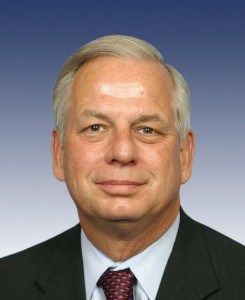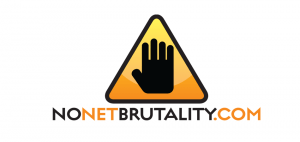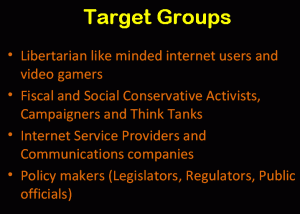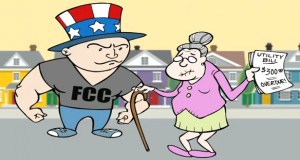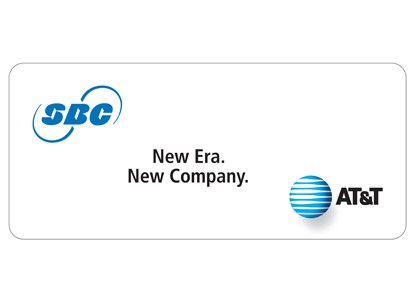The digital divide in broadband has never been just a rural issue. Some of America’s largest cities are filled with families who cannot afford the prices some broadband providers charge for access. So it came as quite a surprise that at least eight members of the Congressional Black Caucus (CBC) decided to oppose the Obama Administration’s efforts to move forward on its telecom agenda of better broadband and Net Neutrality.
It also disturbed James Rucker, executive director of ColorOfChange.org, whose 600,000 members are part of America’s largest African-American online political organization.
Rep. Gene Green (D-Texas/AT&T) circulated a letter opposing regulatory intervention in broadband around Capitol Hill looking for additional signatures from members of Congress. Green’s letter, directed to Federal Communications Commission chairman Julius Genachowski, is the public policy equivalent of a biggie-sized series of lies, distortions, and misrepresentations. Green is so proud of his efforts, constituents can’t find word one about it on his website. Instead, Green claims he is working “to expand Internet access and improve Internet competition, in order to reduce access prices and close the ‘Digital Divide’ between those online and those who are not.'”
Sure he is.
ColorOfChange urged members of Congress not to co-sign Green’s letter:
This letter is not the first time we’ve seen deceptive language or outright misinformation used to advocate against protecting network neutrality. In fact, the telecom industry has for years been engaged in a well-coordinated and massively funded campaign to intentionally misinform the public, Congress, and public interest groups about net neutrality, successfully confusing the issue to their advantage. The industry has spent millions of dollars on advertising, public relations, and lobbying efforts — using industry front groups, ads in Capitol Hill newspapers, and lobbyists. Sadly, the industry in recent years has also managed to enlist members of Congress and advocacy organizations rooted in communities of color to echo misleading and false arguments about net neutrality. This too has been a concern for many ColorOfChange members and has been the subject of our campaign work. While it has a right to engage in the public discourse about this issue, the telecommunications industry has demonstrated a disinterest in honest debate, spreading misinformation that plays on ignorance about the issue, and the somewhat confusing, technical language that surrounds it.
Several of the advocacy groups involved take substantial contributions from telecom companies — notably AT&T and Verizon, or have telecom interests serving on their board of directors. When a minority advocacy group suddenly starts parroting AT&T, Verizon, or Comcast talking points, just follow the money.
Unfortunately, 74 Democrats, including eight members of the CBC aren’t listening to ColorOfChange or their constituents, and co-signed Green’s letter. James Rucker notes:
Last week, I urged black members of Congress not to sign this letter. But we quickly learned that Representatives G.K. Butterfield (D-NC), Yvette Clarke (D-NY), Lacy Clay (D-MO), Alcee Hastings (D-FL), Eddie Bernice Johnson (D-TX), Greg Meeks (D-NY), Bobby Rush (D-IL), and Bennie Thompson (D-MS) didn’t get the message.
Those wondering why these eight members were in such a hurry to disconnect their constituents’ interests need only consider the enormous campaign contributions sent to them by the phone and cable industry:
| Name | Total Contributions (2010 cycle) |
| G.K. Butterfield | $33,500 |
| Yvette Clarke | $13,000 |
| Lacy Clay | $12,000 |
| Alcee Hastings | $23,500 |
| Eddie Bernice Johnson | $19,000 |
| Gregory Meeks | $27,000 |
| Bobby Rush | $32,500 |
| Bennie Thompson | $29,500 |
Source: Opensecrets.org
That’s only for this year — and we’re only five months into 2010. Co-signing Green’s letter could add an extra zero to the amount on the next check.
Rep. Green himself is no stranger to campaign contributions from telecom companies. So far in 2010, he’s accepted money from both AT&T, Verizon, and the National Cable & Telecommunications Association. Since 2000, every time a major public policy debate fires up over telecommunications issues, AT&T (and its predecessor SBC) increased the amount on Green’s check. During the 2004-2006 cycle, when SBC sought a merger with AT&T, SBC contributed $11,500 to Rep. Green. During the first round of the battle to secure Net Neutrality in 2006-2007, AT&T was Green’s top donor with a $15,000 contribution.
ColorOfChange.org today announced a new campaign directed towards the eight CBC members who co-signed Green’s letter.
![]() “Our members are deeply concerned that by signing Green’s letter, black members of Congress are taking a stance that fails to secure our digital rights,” said James Rucker, executive director of ColorOfChange.org. “Some CBC members have perhaps signed Rep. Green’s letter without fully understanding what is at stake while others seem to know, but are serving other interests. There is a significant correlation between those leading the charge and those accepting significant contributions from the industry which stands to benefit from the FCC being rendered impotent. In either case, our members are eager to make clear how important this issue is to our community and to Americans in general, and to explain why they see this as a 21st century civil rights issue.”
“Our members are deeply concerned that by signing Green’s letter, black members of Congress are taking a stance that fails to secure our digital rights,” said James Rucker, executive director of ColorOfChange.org. “Some CBC members have perhaps signed Rep. Green’s letter without fully understanding what is at stake while others seem to know, but are serving other interests. There is a significant correlation between those leading the charge and those accepting significant contributions from the industry which stands to benefit from the FCC being rendered impotent. In either case, our members are eager to make clear how important this issue is to our community and to Americans in general, and to explain why they see this as a 21st century civil rights issue.”
The group is calling on members to place more than 1,750 phone calls to all eight representatives, urging they stop representing the interests of phone and cable companies and start representing the interests of their constituents. ColorOfChange is asking everyone to ask these members to promptly remove their names from Rep. Green’s letter, which represents little more than propaganda talking points from big telecom.
Last month, a federal court removed the FCC’s authority to enact the most basic consumer protections over broadband given its current classification, which was decided upon by a previous set of commissioners. The court ruled that the agency did not have the authority to institute the desired protections while broadband was designated an information (or Title I) service, over which the FCC has limited jurisdiction. The ruling prevented the FCC from implementing proposed rules on network neutrality and cast a cloud of uncertainty over its authority to implement portions of the National Broadband Plan intended to close the digital divide.
Earlier this month, the FCC announced it would reassert its authority to enact limited regulation of broadband by reclassifying it as a communication (or Title II) service. In response, telecommunications industry lobbyists have stepped up their efforts to influence lawmakers. Rep. Green’s letter parrots long-debunked arguments that serve the interests of major industry players and threaten the FCC’s ability to make rulings that would expand broadband access.


 Subscribe
Subscribe